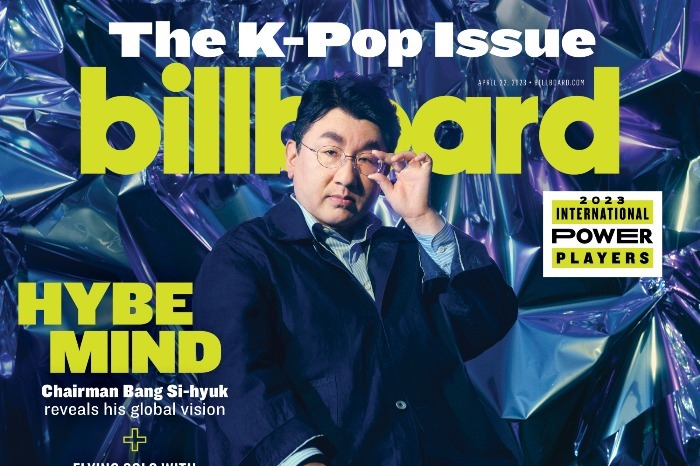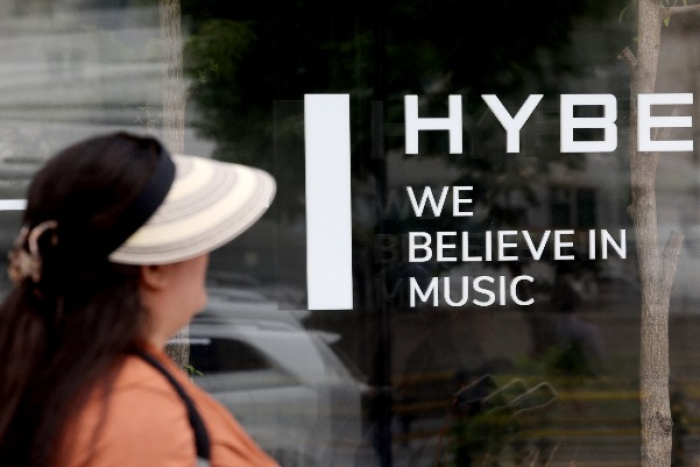K-pop: Pros and cons of HYBE's multi-label system
The NewJeans label's alleged coup attempt reveals the challenge of K-pop's management and production system
By Apr 24, 2024 (Gmt+09:00)
LG Chem to sell water filter business to Glenwood PE for $692 million


KT&G eyes overseas M&A after rejecting activist fund's offer


Kyobo Life poised to buy Japan’s SBI Group-owned savings bank


StockX in merger talks with Naver’s online reseller Kream


Meritz backs half of ex-manager’s $210 mn hedge fund



Disputes between HYBE Co. and its label behind popular girl group NewJeans has made headlines as an almost unheard-of conflict in the K-pop industry.
Industry observers said their clash has brought to the surface the challenge facing the K-pop industry’s multi-label system, pioneered by HYBE, the company behind global sensation BTS.
HYBE is seeking to sack Min Hee-jin, the chief of ADOR, which has been directing and producing NewJeans, as it is investigating allegations that she has been attempting to take over the label with support from outside investors.
But Min refuted the allegations, saying that the conflict with the parent originally stemmed from another HYBE label’s alleged plagiarism in directing and producing a new girl group ILLIT.

In the Korean entertainment industry, a label refers to a subsidiary under an entertainment company.
Bang Si-hyuk, founder and chairman of HYBE, introduced the multi-label system after acquiring leading music agencies. Its local peer JYP Entertainment Corp. has also adopted the model, followed by SM Entertainment Co. last year.
The parent company takes charge of management, including accounting and setting up facilities, so that each label can focus on producing artists independently to maintain their identity and creativity.
In such a horizontal relationship, however, the labels can compete and be involved in power struggles within the group.
The multi-studio model has been credited for the strong performance of K-pop idols and for generating a steady stream of profits for their parent companies with the void left by some artists on temporary hiatus or in military service filled by other stars.
HYBE owns Big Hit Entertainment behind BTS; Belift Lab for boy band ENHYPEN; Source Music for Lesserafim; Pledis Entertainment for Seventeen; and K’Oz Entertainment established by rapper Zico.

In 2023, HYBE flagged its highest-ever annual revenue of 2.18 trillion won ($1.6 billion), up 22.6% from the year prior. Its operating profit spiked 24.9% to 295.6 billion won.
Earnings at ADOR, the agency for NewJeans, accounted for 11% of the total with 33.5 billion won. Its revenue of 110.2 billion won represented a mere 5% of its parent company’s.
The disputes between HYBE and ADOR have pushed HYBE’s share price 9% lower since Monday as investors questioned the sustainability of its multi-label system.
Now that HYBE is expected to join the ranks of South Korean conglomerates in terms of market capitalization and as the first entertainment company to do so, market eyes are on how the K-pop powerhouse can deal with the challenge triggered by ADOR’s alleged spin-off attempt and write a new growth story.
Write to Mina Lee at helper@hankyung.com
Yeonhee Kim edited this article
-

-

-
 K-popUniversal Music acquires 10-year distribution rights to HYBE music
K-popUniversal Music acquires 10-year distribution rights to HYBE musicMar 27, 2024 (Gmt+09:00)
3 Min read -
 K-popBTS agency HYBE logs record sales backed by albums, concerts
K-popBTS agency HYBE logs record sales backed by albums, concertsFeb 26, 2024 (Gmt+09:00)
2 Min read -
 Korean stock marketNetmarble sells 6% stake in BTS label HYBE in block deal
Korean stock marketNetmarble sells 6% stake in BTS label HYBE in block dealNov 07, 2023 (Gmt+09:00)
1 Min read -

-
 The KED ViewK-pop without ‘K’ nurtured to evolve into global mainstream genre
The KED ViewK-pop without ‘K’ nurtured to evolve into global mainstream genreSep 19, 2023 (Gmt+09:00)
3 Min read -

-
 EntertainmentUp close and personal look at HYBE workplace, culture
EntertainmentUp close and personal look at HYBE workplace, cultureJul 04, 2023 (Gmt+09:00)
7 Min read -
 Capital raisingHYBE in talks to raise $380 million to reach beyond K-pop: Bloomberg
Capital raisingHYBE in talks to raise $380 million to reach beyond K-pop: BloombergJun 02, 2023 (Gmt+09:00)
3 Min read -
 Korean stock marketHYBE employees accused of insider stock trading over BTS
Korean stock marketHYBE employees accused of insider stock trading over BTSMay 31, 2023 (Gmt+09:00)
2 Min read -
 Mergers & AcquisitionsTimeline of HYBE's failed bid for SM vs Kakao
Mergers & AcquisitionsTimeline of HYBE's failed bid for SM vs KakaoMar 12, 2023 (Gmt+09:00)
3 Min read -
 Mergers & AcquisitionsHYBE to buy 2 labels in the Americas after dropping SM bid
Mergers & AcquisitionsHYBE to buy 2 labels in the Americas after dropping SM bidMar 15, 2023 (Gmt+09:00)
3 Min read


